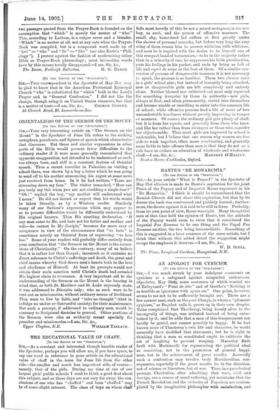THE EDUCATIONAL VALITE OF CHAFF
[To THE EDITOR OF THE " SPECTATOR."f Si,—As a constant and interested though humble reader of the Spectator, perhaps you will allow me, if you have space, to say one word in reference to your article on the educational value of chaff in the issue for June 7th from the other side—the smaller and much less important side, of course— namely, that of the girls. During my time at one of our largest girls' public schools I used to think a good deal about this subject, and as those days are not very far away, the con- clusions of one who has " chaffed " and been " chaffed " may be of some slight interest. The class of boys on whom chaff falls most heavily (if this be not. a mixed metaphor) is the new boy, as such, and the person of offensive manners. The small, shy, home-bred lad suffers at first greatly under the shower of personal remarks, but before very long the very sting of them rouses him to answer witticism with witticism, and soon he is inspired with the desire to be himself one of this compact band of tormentors,—to be in the majority rather than in a minority of one; he suppresses his little peculiarities, puts his feelings in his pocket, and ends by being as full of life and esprit de corps as the best of them. Of a similar con- version of persons of disagreeable manners it is not necessary to speak, the process is so familiar. These two classes exist in a girls' school also ; but instead of instantly being attacked, new or disagreeable girls are left completely and entirely alone. Neither blamed nor criticised—at most only reproved for something irregular by those in authority—new girls, always at first, and often permanently, shrink into themselves and become unable or unwilling to enter into the common life of school; while offensive persons lead a life of more oil' less uncomfortable loneliness without greatly improving in temper or manners. Of course, the ordinary girl gets plenty of chaff, but it is from her equals, and generally from those who know and like her rather than from strangers or those who consider her objectionable. That most girls are improved by school is undeniable, but I believe that one reason why women are less able to work together, often more overbearing, and generally more liable to take offence than men is that they do not as a rule have to endure an education of wholesale and wholesome chaff.—I am, Sir, MA.RGERY O'MALLEY. Denton House, Cuddesdon, Oxford.










































 Previous page
Previous page